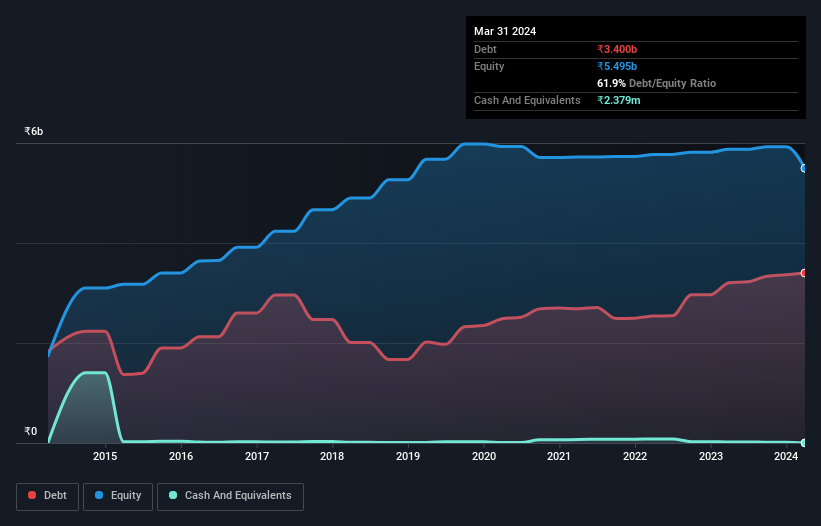- India
- /
- Entertainment
- /
- NSEI:SHEMAROO
Shemaroo Entertainment (NSE:SHEMAROO) Is Carrying A Fair Bit Of Debt
Some say volatility, rather than debt, is the best way to think about risk as an investor, but Warren Buffett famously said that 'Volatility is far from synonymous with risk.' When we think about how risky a company is, we always like to look at its use of debt, since debt overload can lead to ruin. Importantly, Shemaroo Entertainment Limited (NSE:SHEMAROO) does carry debt. But the real question is whether this debt is making the company risky.
When Is Debt Dangerous?
Debt assists a business until the business has trouble paying it off, either with new capital or with free cash flow. Part and parcel of capitalism is the process of 'creative destruction' where failed businesses are mercilessly liquidated by their bankers. However, a more usual (but still expensive) situation is where a company must dilute shareholders at a cheap share price simply to get debt under control. Of course, debt can be an important tool in businesses, particularly capital heavy businesses. When we examine debt levels, we first consider both cash and debt levels, together.
See our latest analysis for Shemaroo Entertainment
How Much Debt Does Shemaroo Entertainment Carry?
As you can see below, at the end of March 2024, Shemaroo Entertainment had ₹3.40b of debt, up from ₹3.21b a year ago. Click the image for more detail. And it doesn't have much cash, so its net debt is about the same.

How Strong Is Shemaroo Entertainment's Balance Sheet?
According to the last reported balance sheet, Shemaroo Entertainment had liabilities of ₹4.60b due within 12 months, and liabilities of ₹129.0m due beyond 12 months. Offsetting this, it had ₹2.38m in cash and ₹2.00b in receivables that were due within 12 months. So it has liabilities totalling ₹2.72b more than its cash and near-term receivables, combined.
This is a mountain of leverage relative to its market capitalization of ₹4.28b. This suggests shareholders would be heavily diluted if the company needed to shore up its balance sheet in a hurry. The balance sheet is clearly the area to focus on when you are analysing debt. But you can't view debt in total isolation; since Shemaroo Entertainment will need earnings to service that debt. So when considering debt, it's definitely worth looking at the earnings trend. Click here for an interactive snapshot.
Over 12 months, Shemaroo Entertainment reported revenue of ₹7.1b, which is a gain of 27%, although it did not report any earnings before interest and tax. Shareholders probably have their fingers crossed that it can grow its way to profits.
Caveat Emptor
While we can certainly appreciate Shemaroo Entertainment's revenue growth, its earnings before interest and tax (EBIT) loss is not ideal. To be specific the EBIT loss came in at ₹58m. Considering that alongside the liabilities mentioned above does not give us much confidence that company should be using so much debt. Quite frankly we think the balance sheet is far from match-fit, although it could be improved with time. For example, we would not want to see a repeat of last year's loss of ₹407m. So to be blunt we do think it is risky. The balance sheet is clearly the area to focus on when you are analysing debt. However, not all investment risk resides within the balance sheet - far from it. Case in point: We've spotted 3 warning signs for Shemaroo Entertainment you should be aware of, and 2 of them don't sit too well with us.
At the end of the day, it's often better to focus on companies that are free from net debt. You can access our special list of such companies (all with a track record of profit growth). It's free.
New: Manage All Your Stock Portfolios in One Place
We've created the ultimate portfolio companion for stock investors, and it's free.
• Connect an unlimited number of Portfolios and see your total in one currency
• Be alerted to new Warning Signs or Risks via email or mobile
• Track the Fair Value of your stocks
Have feedback on this article? Concerned about the content? Get in touch with us directly. Alternatively, email editorial-team (at) simplywallst.com.
This article by Simply Wall St is general in nature. We provide commentary based on historical data and analyst forecasts only using an unbiased methodology and our articles are not intended to be financial advice. It does not constitute a recommendation to buy or sell any stock, and does not take account of your objectives, or your financial situation. We aim to bring you long-term focused analysis driven by fundamental data. Note that our analysis may not factor in the latest price-sensitive company announcements or qualitative material. Simply Wall St has no position in any stocks mentioned.
Have feedback on this article? Concerned about the content? Get in touch with us directly. Alternatively, email editorial-team@simplywallst.com
About NSEI:SHEMAROO
Shemaroo Entertainment
Engages in the distribution of content for broadcasting of satellite channels, physical formats and digital technologies in India.
Good value with mediocre balance sheet.
Similar Companies
Market Insights
Community Narratives



